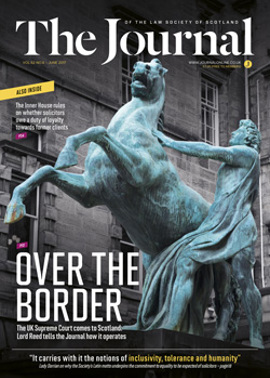Law reform roundup
The Society’s committees have been working on a number of Scottish and UK Parliament bills and consultations. Key areas are highlighted below. For more information see www.lawscot.org.uk/law-reform
Domestic Abuse (Scotland) Bill
The Criminal Law Committee responded to the Scottish Parliament Justice Committee’s call for evidence. Committee member Grazia Robertson also gave evidence to the Justice Committee on 30 May. The committee would welcome changes to the law which would better reflect the current understanding of what constitutes domestic abuse and provide greater protection for victims or potential victims of psychological abuse, and this needs to be addressed. It is not convinced, however, that the case has been made for the creation of a distinct offence which is confined to partners and ex-partners, not least because much of this behaviour can already be prosecuted.
The committee believes that the new bill may therefore create further fragmentation. There may also be practical issues relating to prosecution of the proposed offence, in particular, difficulties in obtaining sufficient evidence. It also questioned the scope of the legislation, as controlling behaviour is not limited to partners or ex-partners.
The Great Repeal Bill
The Constitutional Law Subcommittee responded to the UK Government’s Great Repeal Bill white paper, which sets out proposals for ensuring a functioning statute book once the UK has left the EU.
It welcomes the white paper and has urged the Government to consult as soon as possible on the draft clauses of the bill. This will ensure the widest possible discussion and debate ahead of the introduction of the bill in the new Parliament. Specific concerns were raised about the use of Henry VIII powers, their proper scrutiny and the relationship of the exercise of those powers with devolution. The Sewel convention does not apply to secondary legislation and the white paper gives no indication of the extent to which such legislation will be consulted on. The committee recommended that each order be consulted on and accompanied by a financial memorandum and economic impact assessment.
Beneficial ownership register
The Property & Land Law Reform Subcommittee and the Banking, Company & Insolvency Law Subcommittee responded to the UK Government’s Department for Business, Energy & Industrial Strategy consultation on a beneficial ownership register to increase the transparency of overseas companies investing in UK property or tendering for public contracts, and to combat money laundering, corruption and terrorism.
Both committees fully support the aims of the proposal. Furthermore, the Scottish legal profession serves clients across the globe, and the committees recognise the benefits which may result from a more transparent economy and welcome measures to encourage investment. However, care should also be taken to avoid introducing measures which may impose a burden on legitimate businesses and commercial activities without effectively dissuading businesses or individuals intent on criminality. It is also important to ensure that the system fits around the different property law systems in the UK.
Pensions
The Pensions Law Subcommittee responded to the Department for Work & Pensions consultation on the draft Occupational Pension Schemes (Employer Debt) (Amendment) Regulations 2017.
The proposed deferred debt arrangement option may provide relief to some employers, but the circumstances are limited and there will be additional costs in meeting the complicated conditions. The simpler option, and one that achieves greater consistency of treatment, would be to amend the multi-employer debt provisions so that ceasing to employ active members does not trigger employer debt. Legislation is already in place to prevent employers seeking to abandon or avoid liabilities in those types of schemes.
Protecting NHS whistleblowers
The Health & Medical Law Subcommittee responded to the UK Department for Health consultation on protecting whistleblowers seeking jobs in the NHS.
In order to provide clarity the committee suggested that consideration should be given to the Thomson Reuters Foundation and Blueprint for Free Speech report, which made a number of key recommendations seeking to afford greater help and improve protection for whistleblowers. Crucially, it identifies that the Act lacks the most critical element of any protection framework – preventing or quickly stopping the full retaliation of the whistleblower by their employer, through pre-retaliation protection mechanisms.
The Policy Team can be contacted on any of hte matters above by email or on Twitter @lawscotIn this issue
- Neutrality policies in commercial companies
- Court IT: the young lawyers' view
- Human rights: answering to the UN
- Galo and fair trial: which way for Scotland?
- Secondary victims in clinical negligence
- Reading for pleasure
- Opinion: Alan W Robertson
- Book reviews
- Profile
- President's column
- Twin tracks to completion
- People on the move
- Court of the nations
- Second time around
- How to avoid a summer tax scorcher
- Humani nihil alienum: a call to equality
- Sheriff commercial procedure: count 10
- Taking a pay cut: fair to refuse?
- Fine to park here?
- Enter the Bowen reforms
- Home grown
- Limited partnerships: a new breed
- Salvesen fallout: the latest round
- Gambling in football – the Scottish perspective
- Scottish Solicitors' Discipline Tribunal
- Changing sides
- Business drivers
- CCBE comes to Edinburgh
- "Find a solicitor" gets an upgrade
- Law reform roundup
- Thoughts on a frenetic year
- Check those bank instructions
- Fraud alert – ongoing bank frauds identified
- AML: sizing up the risk
- Master Policy Renewal: what you need to know
- Without prejudice
- What's the measure of a ruler?
- Ask Ash






